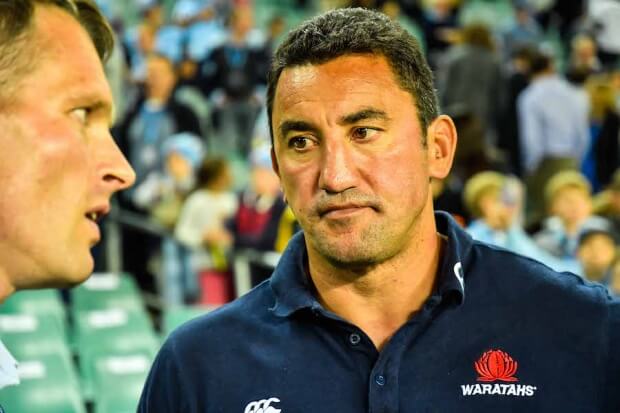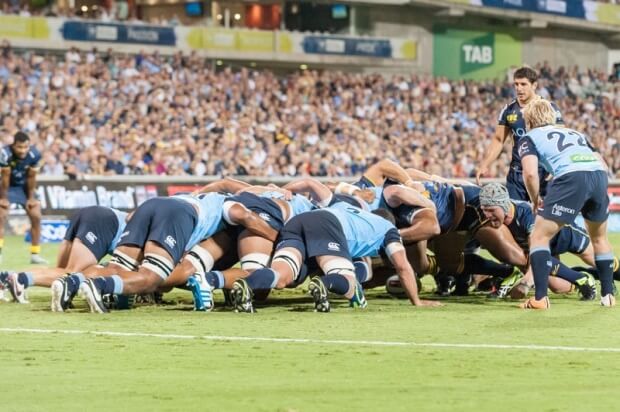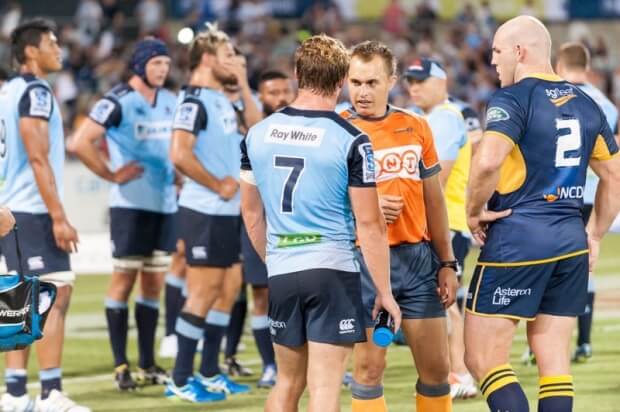Waratahs Season:
2016 has been a disappointing season for the Waratahs. They started with a big win that probably lulled them into a false sense of security. Then they got beaten up by the Brumbies in Canberra, had a bye, lost to the Highlanders in a close one, squeaked home against the Reds, lost a disaster of a game against the Rebels, had another bye, then lost a close one to the Brumbies at home. At the halfway mark they had two wins against the Reds, whose only weapon was their scrum, and the rest were losses. A disaster, moreso because of the manner of their losses. Their scrum was pushed around by everyone, their lineout was disfunctional, their passing and handling were poor and they were on the wrong side of the penalty count repeatedly. If it wasn’t for the Kings, Force and Sunwolves they would have been wooden spoon candidates.
Slowly they began to turn their season around. A big win against the Force, a magnificent win against the Stormers in Cape Town, wins at home against the Cheetahs and Bulls. The Bulls win was marred by the season-ending injury to their best player Kurtley Beale. This was followed by a disappointing loss to the Crusaders in Christchurch. Then just before the mid-season break they demolished the Chiefs in a display that had “champions” written all over it. Perversely that week they were pushed out of top spot in the conference by the Brumbies.
After the England series there was a big win against the Sunwolves away, then came the loss to the Hurricanes at home, which basically finished their season. They lost their last game against the Blues at graveyard Eden Park in a close game. By the end of the regular season they had become the only Australian team that were competitive against any NZ team.

The Couldabeen Champions:
I rewatched the last two games in preparation for this article. Win those two games and the Waratahs could have made up for their terrible season start and gone deep into the finals. Hindsight and distance have helped clarify a few issues:
- The primary cause of both losses was the defensive system the Waratahs play. The system requires the defensive line to move up quickly and stop passage of the ball to the wings. But the opposition winger and sometimes the next player in are left unmarked, as the outside man works to shepherd the play back in. When it works its brilliant and against lesser teams it worked a treat. But against the NZ teams the lack of defensive numbers on the outside was the difference between a big win and a gutting loss. In the Hurricanes game they scored three tries by getting on the outside of the Waratah’s defensive line. The Blues scored a try down the left by similar means.
- Naiyaravoro’s stupidity in getting a yellow card, later adjudged to be a red card offense, was the other primary cause of the loss. It was so clumsy as to be comical except that it was extremely dangerous. For a crucial ten minutes in a very close game the Tahs were a player short.
- The level of skill shown at the back end of the season was approaching that of 2014; unfortunately it was only approaching that. The dynamism of Douglas was the missing ingredient – as the song says “You don’t know what you’ve got till its gone.” Skelton provides a different kind of dynamic and Mumm and Dennis are really functional 6’s who play as locks. Given Australian front rowers are slackers by comparison with their NZ counterparts, there is a clear deficit in the tight five. If 2017 is not to be a repeat, then either we need to import a tight-work lock or require something different from the front row.
- In both games the referee had a huge influence on the outcome. Pollock missed a blatant Hurricanes trip completely and then just penalised a neck roll by Barrett, rather than card him. The look of relief on Barratt’s face was palpable – he knew he was gone for all money. Those two cards would probably have changed the outcome; the match was very close. In the Blues game there were three penalty tries (two to the Waratahs and one to the Blues) and in defiance of the protocols no player was carded. Tu’ungafasi was penalised at least five times for standing up in the scrum, four of them five metres out, and still remained on the field. No northern hemisphere referee would have allowed that to go on without sanction. The problem is that despite the Waratahs having a clear advantage in that facet of play, scoring two penalty tries, they basically gained no real extra advantage from their dominance.
The match against the competition-leading Chiefs showed what might have been. The competition leaders were blown off the park by a complete Waratah game. In describing the game, others have said that the Waratahs did a “NZ” on the Chiefs. Although the Chiefs were beaten again in the finals, they were never again smashed as they were that day. Had the team maintained that intensity through to round 17, another winning final was on the cards.

Scrum:
Comebacks? Lazarus with a triple bypass had nothing on the Waratahs scrum. In the first four games the Waratah scrum was so bad I could barely watch the screen without cringing. Ta’avao was on roller skates backwards, and he was getting no help from anywhere. Three things turned it around: Tom Robertson appeared from nowhere and steadied the tight head side, TPN came back from injury and started to come good and Blades began to get a handle on what had to change in the way things operated. Ryan was moved to loose head and over the season grew into the role. The loss of Fat Cat to career-ending injury wasn’t a disaster, except for Ben himself.
It wasn’t just Ta’avao’s fault. By the time the Waratahs got to South Africa they had turned it around completely. In the last five minutes, with the game on the line and Tilse and Ta’avao propping (yes, Tilse and Ta’avao) they smashed the Stormers’ front row and took a tight-head off them that won the match.
Lineout:
All year you could never tell which lineout was going to turn up each week. One week it would be solid with us safely securing all our own throws, the next we would lose five or six of our own. One thing was pretty constant. We never threatened the other teams’ lineouts. I doubt we won more than seven or eight opposition throws all year. Now Dave Dennis has gone and with Dean Mumm still doubtful this looks like it will be next year’s disaster. Ned Hanigan is not ready to start and some of the old heads say he’s a 6 anyway. Lousi has gone to the Hurricanes and that will be their gain and our loss. We need a top class import and should be prepared to pay Folau-type money to get him (its the only way we will get the quality we need).
Off-loading:
In attack the Waratahs play a similar game to the NZ teams. Of all the Australian teams, they understand the effectiveness of the offload best and its a real feature of their play. But often that offload comes in the actual tackle while their bodies are on the way to the ground. The most effective offloads occur when the ball is delivered just before the tackler hits or as the hit is made, because those offloads can be delivered accurately without interference. A lot of the dropped ball came from offloads that were not clean, because they were delivered a fraction of a second too late. That’s a skill that should have been learnt at training, timing the offload for maximum effectiveness while still committing the defender.
General play:
The Waratahs play to a gameplan developed in 2013, replacing the discredited systems that they played in the Hickey/Foley years. It is not, as is widely thought, a purely ball in hand game. They do not run every ball and never kick, but their predominant style is to play with ball in hand away from the point of the last breakdown. How far away from the last breakdown will vary; in the game against the Chiefs they were very direct, in other games they moved it wider.
It proved effective. The Waratahs scored enough points to beat most teams in the second half of the season. The problem was that their defence leaked too many points, either through tries or penalty kicks. Turnover ball was high too, usually due to skill errors. This was only partly due to the pace at which they were trying to play; sometimes passing and handling skills were awful whatever the pace. But one thing was sure. In the second half of the season, no team was comfortable playing them, even if they won. The potential was there.
Discipline:
Super Rugby is a demanding competition. There is a general attitude that the game must flow and that cards and penalties are to be avoided. The quality of the refereeing is quite variable from the best to the worst and teams have to learn to deal with that.
The Waratahs had quite a poor relationship with some of the referees, and particularly some of those with higher reputations. Partly this was down to poor communication skills and Michael Hooper clearly needs to learn how to manage referees better. But the whole team needs to learn that they have to keep the ref onside if they want to get an unbiased outcome. Better decisions get made when the referee does not feel as if the whole team disrespects him. Players need to confine their communications to their team-mates, it results in a better outcome in the end.
End of part one. Part two tomorrow.



